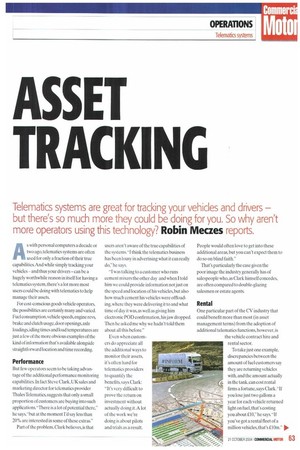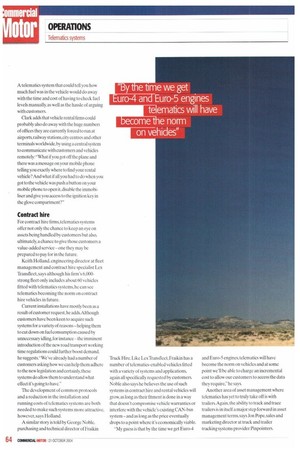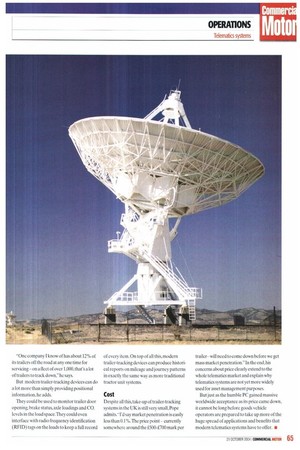ASSET TRACK 1 NG
Page 65

Page 66

Page 67

If you've noticed an error in this article please click here to report it so we can fix it.
Telematics systems are great for tracking your vehicles and drivers — but there's so much more they could be doing for you. So why aren't
more operators using this technology? Robin Meaes reports.
As with personal computers a decade or two ago,telematics systems are often used for only a fraction of their true capabilities. And while simply tracking your vehicles— and thus your drivers —can be a hugely worthwhile reason in itself for having a telematics system, there's a lot more most users could be doing with telematics to help manage their assets.
For cost-conscious goods vehicle operators, the possibilities are certainly many and varied. Fuel consumption, vehicle speeds,engine revs, brake and clutch usage,door openings,axle loadings,idling times and load temperatures are just a few of the more obvious examples of the kind of information that's available alongside straightforward location and time recording.
Performance
But few operators seem to be taking advantage of the additional performance monitoring capabilities. In fact Steve Clark, UK sales and marketing director for telematics provider Thales Telematics, suggests that only a small proportion of customers are buying into such applications. 'There is a lot of potential there," he says, "hut at the moment I'd say less than 20% are interested in some of these extras."
Part of the problem. Clark believes, is that users aren't aware of the true capabilities of the systems. "I think the telematics business has been lousy in advertising what it can really do," he says.
"I was talking to a customer who runs cement mixers the other day and when I told him we could provide information not just on the speed and location of his vehicles, but also how much cement his vehicles were offloading, where they were delivering it to and what time of day it was, as well as giving him electronic POD confirmation, his jaw dropped. Then he asked me why we hadn't told them about all this before."
Even when customers do appreciate all the additional ways to monitor their assets, it's often hard for telematics providers to quantify the benefits, says Clark: "It's very difficult to prove the return on investment without actually doing it, A lot of the work we're doing is about pilots and trials as a result. People would often love to get into these additional areas, but you can't expect them to do so on blind faith."
That's particularly the case given the poor image the industry generally has of salespeople who, as Clark himself concedes, are often compared to double-glazing salesmen or estate agents.
Rental
One particular part of the CV industry that could benefit more than most (in asset management terms) from the adoption of additional telematics functions, however, is the vehicle contract hire and rental sector.
To take just one example, discrepancies between the amount of fuel customers say they are returning vehicles with, and the amount actually in the tank, can cost rental firms a fortune, says Clark. "If you lose just two gallons a year for each vehicle returned light on fuel, that's costing you about £10," he says. "If you've got a rental fleet of a million vehicles, that's £10m. 11110. A telematics system that could tell you how much fuel was in the vehicle would do away with the time and cost of having to check fuel levels manually, as well as the hassle of arguing with customers.
Clark adds that vehicle rental firms could probably also do away with the huge numbers of offices they are currently forced to run at airports, railway stations, city centres and other terminals worldwide, by using a central system to communicate with customers and vehicles remotely: "What if you got off the plane and there was a message on your mobile phone telling you exactly where to find your rental vehicle? And what if all you had to do when you got to the vehicle was push a button on your mobile phone to open it, disable the immobiliser and give you access to the ignition key in the glove compartment?"
Contract hire
For contract hire firms, telematics systems offer not only the chance to keep an eye on assets being handled by customers but also, ultimately, a chance to give those customers a value-added service — one they may be prepared to pay for in the future.
Keith Holland. engineering director at fleet management and contract hire specialist Lex Transfleet, says although his firm's 6,000strong fleet only includes about 60 vehicles fitted with telematics systems, he can see telematics becoming the norm on contract hire vehicles in future.
Current installations have mostly been as a result of customer request, he adds,Although customers have been keen to acquire such systems for a variety of reasons— helping them to cut down on fuel consumption caused by unnecessary idling, for instance—the imminent introduction of the new road transport working time regulations could further boost demand, he suggests. "We've already had a number of customers asking how we can help them adhere to the new legislation and certainly, these systems do allow them to understand what effect it's going to have."
The development of common protocols and a reduction in the installation and running costs of telematics systems are both needed to make such systems more attractive, however, says Holland.
A similar story is told by George Noble, purchasing and technical director of Fraikin Truck Hire. Like Lex Transfleet, Fraikin has a number of telematics-enabled vehicles fitted with a variety of systems and applications, again all specifically requested by customers. Noble also says he believes the use of such systems in contract hire and rental vehicles will grow, as long as their fitment is done in a way that doesn't compromise vehicle warranties or interfere with the vehicle's existing CAN-bus system— and as long as the price eventually drops to a point where it's economically viable.
"My guess is that by the time we get Euro-4 and Euro-5 engines, telernatics will have become the norm on vehicles and at some point we'll be able to charge an incremental cost to allow our customers to access the data they require," he says.
Another area of asset management where telematics has yet to truly take off is with trailers.Again, the ability to track and trace trailers is in itself a major step forward in asset management terms, says Jon Pope, sales and marketing director at truck and trailer tracking systems provider Pinpointers. "One company I know of has about 12% of its trailers off the road at any one time for servicing— on a fleet of over 1,000, that's a lot of trailers to track down," he says.
But modern trailer-tracking devices can do a lot more than simply providing positional information, he adds.
They could be used to monitor trailer door opening, brake status, axle loadings and CO, levels in the load space.They could even interface with radio frequency identification (RFID) tags on the loads to keep a full record of every item. On top of all this, modern trailer-tracking devices can produce historical reports on mileage and journey patterns in exactly the same way as more traditional tractor unit systems.
Cost Despite all this, take-up of trailer-tracking systems in the UK is still very small, Pope admits. "I'd say market penetration is easily less than 0.1% .The price point — currently somewhere around the .£500-000 mark per trailer— will need to come down before we get mass market penetration." In the end, his concerns about price clearly extend to the whole telematics market and explain why telematics systems are not yet more widely used for asset management purposes.
But just as the humble PC gained massive worldwide acceptance as its price came down, it cannot be long before goods vehicle operators are prepared to take up more of the huge spread of applications and benefits that modern telematics systems have to offer. •


































































































































































































